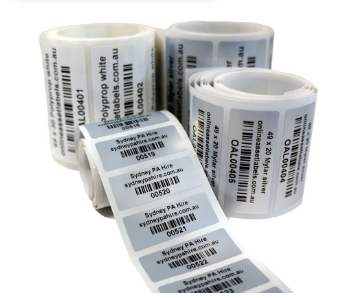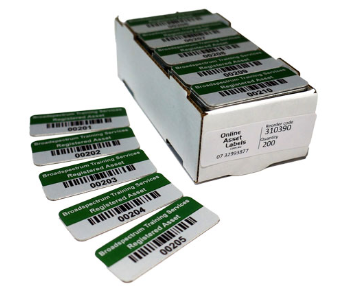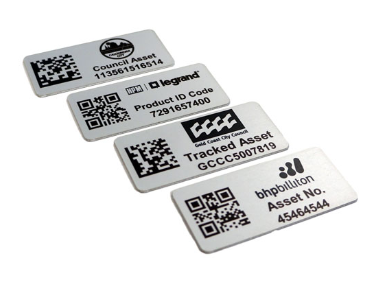An Asset Register is a record that tracks a business’ physical assets.
An Asset Register is a comprehensive inventory of an organisation's tangible assets. It is a document that lists all of the assets owned by an organisation, along with information about each asset, such as its location, condition, value, and other relevant details. An Asset Register helps organisations to manage their assets more effectively, make informed decisions about their use and maintenance, and plan for their replacement or disposal.
It is a valuable Asset ID and Tracking Tool that can be used for commercial decision making and Financial Reporting purposes. Think of it like a stock-take: identify everything you have, itemise it, label it, and document it.
To complete an Asset Register, you must conduct a full site inspection and record the following details:
The make, model, and serial number of each item
The physical location within the premises
A description of its physical attributes and condition
The asset class or category
The Asset Register can then be expanded to include:
Purchase Details (Dates, Cost, Supplier)
Warranty Information
Servicing Schedule
Effective Life, Written Down Value and Depreciation Schedule
Defects and Maintenance Registers
It is a meticulous and painstaking task to produce an Asset Register, but it results in an invaluable document that can be used for a multitude of purposes, including stock taking, storing warranty information, and having a record of the value of your assets for insurance claims.
Challenges of Producing your own Asset Register
Market research suggests that many organisations face difficulties producing their own asset registers. Some common challenges include:
Lack of Resources: Creating an Asset Register can be a time-consuming and resource-intensive task, especially for larger organisations with a diverse range of assets. Organisations may struggle to allocate sufficient staff and budget resources to the task.
Data Quality Issues: Asset registers require accurate and up-to-date information about each asset, including its condition, location, and value. However, many organisations struggle with data quality issues, such as incomplete or inaccurate data, which can make it difficult to create an accurate asset register.
Complex Asset Portfolios: Organisations with complex asset portfolios, such as those in the manufacturing or construction industries, may find it challenging to capture all of their assets accurately and comprehensively.
Lack of Standardisation: Without a standardised approach to Asset Management, different departments or business units may use different methods of recording and reporting on assets, which can make it difficult to create a unified asset register.
Technology Limitations: Some organisations may lack the technology infrastructure needed to create and maintain an Asset Register. For example, they may not have access to the necessary software or hardware, or their existing systems may not be able to handle the volume or complexity of asset data.
Creating an Asset Register can be a complex and resource-intensive task for many organisations. However, having a comprehensive and accurate Asset Register is critical for effective Asset Management and can help organisations make informed decisions about their Assets.
Benefits of Asset Registers:
Identification & Tracking:
- An Asset Register provides accurate identification and tracking of all Plant & Equipment assets, making it easy to locate specific items
- Asset Registers are especially useful for companies with assets across multiple locations
Insurance:
- Asset Registers provide a simple and accurate document for contents/business insurance, avoiding over or under-insured situations
- Asset Registers can be used to facilitate insurance claims
Accounting:
- Asset Registers form part of the Financial Statements (Balance Sheet), simplifying budgeting and forecasting processes
Legal and Regulatory Compliance:
- Public companies, large corporations, and government departments may be required to have an Asset Register
- Asset Registers can help avoid legal and regulatory issues
How Asset Reports can assist you:
Asset Reports are dedicated to making the complex task of creating and maintaining Asset Registers easier for your organisation.
We offer a comprehensive solution tailored to your needs and provide you with:
Efficiency and Expertise:
We have experienced professionals who are adept at conducting detailed site inspections and recording all necessary asset information. They can efficiently produce a complete, reliable Asset Register, freeing your staff to focus on their main responsibilities.
Data Quality Assurance:
We understand the importance of high-quality, accurate data. Our team employs rigorous data validation techniques to ensure the information in your Asset Register is complete, correct, and up-to-date.
Custom Solutions for Complex Portfolios:
No matter how diverse or extensive your asset portfolio is, we can handle it. We have experience dealing with all sorts of assets across various industries, ensuring a comprehensive and accurate record.
Standardised Approach:
We provide a uniform, consistent method for tracking and reporting your assets, enabling easier comparisons and analytics across departments or business units.
Ongoing Support and Maintenance:
Creating an Asset Register is not a one-time task. We offer continued support and maintenance services, ensuring your Asset Register stays current and serves as a valuable tool for decision-making and compliance.
Our goal at Asset Reports is to help your organisation maximise the benefits of an Asset Register while minimising the effort required to create and maintain it.
Contact us today to learn more about how we can assist you with your asset management needs.
Asset Labels
Asset Labels are applied to all inventory items in an Asset Register, and are used to assign an identification number to each item. These barcoded labels can be scanned to quickly identify what is and isn't present.
Asset Labels can be ordered independently to create and maintain your own asset register, or in conjunction with ordering an Asset Reports Asset Register.
Producing an Asset Register
Completing your own Asset Register can be a daunting task that takes hours or days of work on site and rigorous quality control and formatting. That’s why we’ve created a helpful how-to guide and FREE downloadable template you can use to produce an asset register for your business.
Or if you’d rather save yourself the stress, contact us for a quote and let our team inspect the property and produce a high-quality, detailed asset register for you. We have the experience and expertise to make sure your asset register is as precise as it needs to be, compiled in a detailed document with a presentation-ready summary.
Trusted by
We provide Asset Registers across a range of industries and uses, including:
Large Commercial Businesses
Government Organisations
Retail Operations
Strata Complexes
Sub-Leased Offices
“We are very pleased with the service provided by Asset Reports – their professionalism, attention to detail, excellent communication and end to end support leaves us with no hesitation in highly recommending them. We are comfortable knowing that all our assets, fit out and condition of all items is fully documented in a format that is easy to understand and ready to provide to any tenant or sub-tenant.
Thank you for the service provided.”














